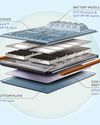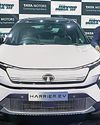
Carlos Tavares is clearly someone who thinks long-term. The CEO of Stellantis is also a pragmatist who takes one thing at a time.
These two traits came through strongly during a recent virtual meeting with select Indian journalists in Chennai where Tavares dwelt upon the Jeep and Citroen brands, the imperatives of electrification, and why Stellantis was here to stay in this intensely competitive market.
As he reiterated, the company had drawn up a nine-year plan with three legs of three years each. "India will more than double the net revenues by far because we are growing our activity (in India). Of course, we want everybody to be above the double digits and we are ready today as a region in Asia-Pacific," he said.
Yet, it was quite clear that India as a market "is not yet ready because we are still growing our operations starting this year". However, he was confident that within a couple of years, Stellantis would have double digits margins as much as the rest of the region. "The rest of the region in Asia-Pacific is already significantly above the double digits and is committed to supporting the corporate goal that is to be completed inside of 2030," elaborated Tavares.
India as a region "is going to double its profits within this time" and in the second leg of the plan the progress will be "clearly visible to all of us". The confidence stems from the fact that a lot of preparation has gone into this exercise with arduous work carried out for many years on localization and vertical integration.
Powertrain benchmark
This story is from the {{IssueName}} edition of {{MagazineName}}.
Start your 7-day Magzter GOLD free trial to access thousands of curated premium stories, and 9,000+ magazines and newspapers.
Already a subscriber ? Sign In
This story is from the {{IssueName}} edition of {{MagazineName}}.
Start your 7-day Magzter GOLD free trial to access thousands of curated premium stories, and 9,000+ magazines and newspapers.
Already a subscriber? Sign In

Spain's Fersa Group invests in India-based Delux Bearings
Besides theRs100 croreinvestment, the Indian company gets access toadvanced technologies and bearings with arange of applications that willhelpinits global growth strategy, writes Manobhava Baruah.

Tata Autocomp to open compact dual-clutch transmission plant
Amidthe country’s growing need for personal mobility with easy manoeuvrability, comes the demand for vehicles with automatic transmission. Tata AutoCompisready tomovein writes Shruti Mishra.

Pankaj Munjal-backed Hero Motors raises equity from GEF Cap
The company willinvest Rs1,500 crore over thenextthree years andit expects 60 percent ofits turnover to come fromelectric vehicle parts. Itaims to becomea Global EV Solutions Company from India

New age thermoplastics for next-generation EV batteries
Saudi-based global materials major SABIChas developed cutting edgein fire-resistant polymers and flame-retardant materials that comply with various EV battery safety standards across the world.

Switch Mobility to meet growing e-bus demand with fresh capex
Oncourse for abillion-dollar business, the company is exploringa possibility of operating satellite factories across the country to serve different geographies, write ShahkarAbidi and Ketan Thakkar.

Kia India to invest Rs 2,000 crore in EVS, to introduce new e-RV in 2025
New investmentto drive R&D, infrastructure development and manufacturing capabilities. The company willlocally produce EVsin India with possibility of exports as well, writes Mayank Dhingra.

"The government has given enough time for indigenisation but the industry has not taken it seriously"
Amitabh Saran, Founder and CEO, Altigreen, shares his views on problems inthe EV industry and battery localisation solutions with Amit Vijay M.

TATA MOTORS SEES ONE INTWO CARS SOLDAS EVS BY 2030
The company aims to offer wider choices withnew EVs that may straddle a pricebracket of Rs20to 40lakhinthe coming years, writes Ketan Thakkar.

MG Motor India in expansion drive, to invest $100 million
The investment willbe usedtoramp up existing production capacity from1.2to1.4-15lakh units per annum atthe automaker's Halol plantin Gujarat, writes Ketan Thakkar.

"Technology and its multiplier effect are driving business transformations and customer experiences"
Technical Centre India is one of Continental’s largest research and development centres in the world, andasa Centre of Competence’ it also develops customised products for the BRIC countries.